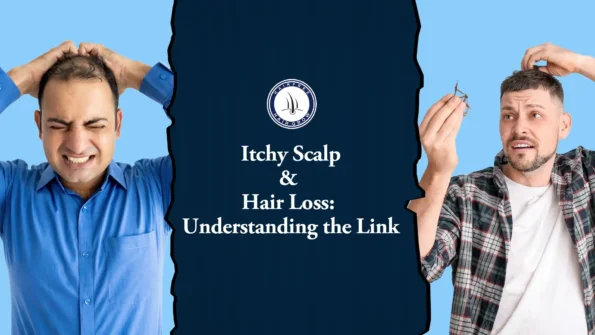An itchy scalp is not only annoying, but it could also be a sign that something isn’t quite right. You might wonder: does having an itchy scalp actually cause hair loss? The short answer is yes, it can. Itchy Scalp and Hair Loss are often interconnected, as persistent scratching can damage hair follicles and lead to hair loss. In this blog, we’ll explore why an itchy scalp could be a problem, the underlying causes, and what you can do to manage it and prevent hair loss.
The Problem of an Itchy Scalp and Hair Loss
Is an itchy scalp something to worry about when it comes to hair loss? Absolutely! There’s never a time when an itchy scalp is a good thing. Your scalp is home to various microorganisms, and when these get out of balance, issues arise. The discomfort is often a sign that something needs attention, and ignoring it can lead to bigger problems, including hair loss.
Common Causes of an Itchy Scalp
There are several reasons your scalp might be itching. Here are the main culprits:
Microbial Infections:
Your scalp is home to various microorganisms like fungus, bacteria, and even tiny parasites called Demodex. These critters feed on the natural oils (sebum) produced by your scalp and can cause serious itching. If left unchecked, they can contribute to hair loss.
Inflammatory Scalp Conditions:
Common conditions like dandruff, seborrheic dermatitis, and psoriasis can lead to itching, flaking, and even inflammation. Seborrheic dermatitis, in particular, can be severe enough to cause significant hair loss. While psoriasis doesn’t directly cause hair loss, it can make the scalp tight, uncomfortable, and even pus-filled when inflamed.
Itchy Scalp Conditions That Can Lead to Hair Loss
While not all itchy scalp conditions cause hair loss, some certainly do. For example, alopecia areata, which causes round patches of baldness, often comes with itching. If your scalp is itching due to any of these conditions, it’s a sign you need to take action.
How to Manage and Treat an Itchy Scalp
So, what can you do if your scalp is itching? Often, the root cause of scalp itching lies in nutrient deficiencies. Your scalp is one of the body’s last lines of defense, and if you’re low on essential nutrients, it can lead to problems.
Here are some key nutrients to check:
Vitamin D3
Zinc
Ferritin and Iron
Getting a blood test to check your levels of these nutrients is a good starting point. If you find deficiencies, addressing them can often resolve the itching. In fact, correcting these nutritional gaps can stop itching in about 70% of cases, reducing inflammation and even slowing down hair loss.
The Role of Nutrition in Scalp Health
When your nutrient levels are optimal, your scalp is better equipped to handle microbial issues and inflammation. This leads to less itching, reduced shedding, and in many cases, more hair growth. So, nutrition plays a critical role in keeping both your scalp and hair healthy.
Choosing the Right Shampoo and Conditioner
What you put on your scalp matters just as much as what you put in your body. Using the wrong shampoo or conditioner can worsen your scalp issues. It’s important to choose products specifically designed to manage itchy scalp conditions. Be careful with oils—while some people use jojoba or peanut oil, these can encourage the growth of bacteria and fungus, making the problem worse.
If you do want to use oils, stick to options like castor oil or extra virgin coconut oil. But don’t leave them on your scalp for longer than 45 minutes. After that, wash them out thoroughly by shampooing them twice and conditioning them afterward. Limit oil treatments to no more than three times a week to avoid making the situation worse.
Additional Tips for Managing an Itchy Scalp
To keep your scalp healthy and itch-free:
- Get your nutritional levels checked and correct any deficiencies.
- Use the right hair care products, avoiding anything that could irritate your scalp.
- Be mindful of how often you apply oils and always wash them out properly.
Conclusion
Dealing with an itchy scalp is more than just about comfort—it’s about protecting your hair from unnecessary loss. The longer you let an itchy scalp go untreated, the more damage it can do. Pay attention to your scalp’s signals, and take action to keep your hair and scalp healthy.
For more tips and advice on hair health visit HairFree and HairGrow Clinc. We’re here to help you with any hair loss concerns you may have.
Written By
MD (Skin & VD)
Dr. Chintan Bhavsar is a hair restoration specialist with expertise in Itchy Scalp and Hair Loss. He offers personalized treatments to address scalp irritation, reduce hair loss, and promote healthy hair growth, ensuring effective and lasting results for his patients.
Disclaimer
We’ve made all possible efforts to ensure that the information provided here is accurate, up-to-date and complete, however, it should not be treated as a substitute for professional medical advice, diagnosis or treatment. See Detailed Disclaimers Here.


